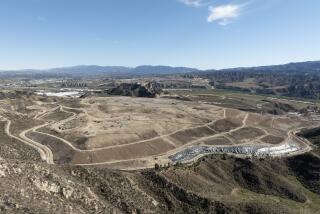J.F. Shea Co. Settles for $3.25 Million in McColl Dump Suit
- Share via
The J.F. Shea Co. on Wednesday agreed to pay a $3.25-million settlement to 39 of 141 families living near the McColl toxic waste dump who have claimed in lawsuits that they should have been warned about the landfill and its hazards.
Shea’s settlement, the largest single one to date in the case, brings the total settlement amount, to be paid by 11 defendants, to $8.75 million, said Jeffrey A. Matz, one of four attorneys representing plaintiff families.
The agreement must still be approved by Orange County Superior Court Judge Jerrold S. Oliver, as must last week’s $2.5-million settlement by the City of Fullerton with all 141 families. If both are approved, it would effectively mean the end of nearly five years of litigation for the 39 families in the Fullerton Crest tract built by Shea, Matz said.
“I’m delighted for my clients because I think this will provide a huge relief for them,” Matz said. “It means that soon they can go about their business, move out of the neighborhood and forget about McColl.”
The Shea settlement works out to $83,333 per family in the Fullerton Crest cases.
Matz estimated that when the $8.75 million is apportioned, each of the 39 Fullerton Crest families would “end up with a gross recovery of $115,000 to $120,000 per family.”
He has said previously that he expects all families to recover “at least $30,000 to $40,000” in damages. With additional settlements from the remaining defendants, the amount could be higher.
Alan Beardsley, an attorney representing the Walnut-based development company confirmed the amount of the settlement but would not comment further.
“Shea has requested that its attorneys not comment on the matter to the press,” Beardsley explained Wednesday. “But a settlement certainly would not be admission of guilt on Shea’s part.”
A Shea company attorney, David P. Yaffe of Universal City, did not return telephone calls.
Shea’s settlement leaves two defendants and 102 families as plaintiffs in the complex legal case whose trial was expected to take up to two years.
One defendant is the William Lyon Co., developer of the Island and Meadows tracts to the southwest and northeast of the abandoned dump. The second is the Fullerton Hills Development Co., a joint venture formed by Lyon and the Chevron Land and Development Co. to build the Meadows development. Matz said settlement negotiations are continuing with attorneys for both. A trial that initially involved most of the defendants was scheduled to begin March 10 but has been delayed pending appeals on court rulings.
Many sources knowledgeable about the case say the Lyon Co. is not inclined to settle. But others say the prospect of facing a jury in a protracted trial over a toxic waste site may push the company to cut its losses.
Lyon attorneys also have challenged many of the previous settlements on the grounds that the amounts did not correspond with each defendant’s share of liability. The California Supreme Court has upheld some of the settlements, including one for $1.4 million agreed to by seven oil companies that deposited refinery waste at the dump during the 1940s.
The dump was created during World War II, when oil companies producing high-octane aviation fuel deposited refinery wastes in 12 sumps on land leased by oil industry consultant Eli McColl. Oil-drilling muds were added later to six of the sumps, which McColl later purchased.
The dump is now beneath a vacant field and part of a golf course on the Los Coyotes Country Club. It is bordered on three sides by expensive homes in northwest Fullerton.
State health officials have determined that the refinery sludge contains sulfuric acid, benzene and arsenic, all highly toxic. Before a canvas covering and layers of earth were placed over the sumps, nearby residents complained that the sulfur dioxide fumes caused headaches, nausea and respiratory problems, mainly during the summer months.
After years of lobbying and studies, a $26.5-million federal Superfund cleanup project was set to remove the foul-smelling sludge and contaminated dirt to a disposal site in Kern County. But cleanup plans were stalled last May 31, when a Superior Court judge ordered a state environmental impact study. The study, now under way, is expected to take at least 12 months to complete.
Not all families are involved in all settlements, but all families are expected to share in about $4.5 million of the $8.75-million total, Matz said Wednesday.
All families have agreed to let retired Judge Joseph Wapner, who appears on television on “People’s Court,” decide how the settlement amount should be divided among the residents. Wapner’s plan must be submitted to Oliver for approval.
Matz said he hopes the plaintiffs will receive some money within 45 days.
“We’re trying to beat income tax day so our clients can do things like put money into Individual Retirement Accounts and things like that before the deadline,” Matz said. “But I’m not sure we’re going to make it.”
More to Read
Sign up for Essential California
The most important California stories and recommendations in your inbox every morning.
You may occasionally receive promotional content from the Los Angeles Times.










